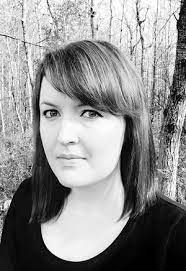ISSN: 1941-4137
POETRY THAT ENACTS THE ARTISTIC AND CREATIVE PURITY OF GLASS
POETRY THAT ENACTS THE ARTISTIC AND CREATIVE PURITY OF GLASS

Jesi Bender is an artist from Upstate New York. She is the author of Dangerous Women (dancing girl press 2022), Kinderkrankenhaus (Sagging Meniscus 2021), and The Book of the Last Word (Whiskey Tit 2019). Her shorter work has appeared in Fence, Vol. 1 Brooklyn, and Duende, among others. For more, visit her website.
May 2, 2022
Edited by Stephanie Kaylor
Edited by Stephanie Kaylor
Finding He(Art) in Reality TV: A Review of Alex Carrigan’s May All Our Pain Be Champagne
 May All Our Pain Be Champagne
by Alex Carrigan
Alien Buddha Press, 2022
May All Our Pain Be Champagne
by Alex Carrigan
Alien Buddha Press, 2022A bish just can’t win.
Can’t wipe tears and
can’t let them dry on our faces either.
Reality TV is not exactly where most of us would expect to find inspiration for high art or anything profound. In fact, many people watch series like the Real Housewives franchise because they are insipid and don’t require much cognitive engagement. It is a time to ‘shut off’ our brains and be entertained by the petty problems of the rich and desperate-to-be-famous. May All Our Pain Be Champagne (Alien Buddha Press, 2022) seeks to invert the assumption that there is nothing substantive underneath all of the costumes and botox and jewels. It makes art out of the pearls these personas leave upon the stage of social media.
Carrigan’s chapbook is a collection of 16 cento poems, or poems made up of lines from other artists. In this case, the poems are created out of tweets from different Real Housewives. This reviewer does know a few of these women but I have been out of the game for a while and do not know the vast majority mentioned in these pages. So, I can speak as someone with some familiarity but can also speak to those readers who have no idea who these women are. Like all good art, being unaware of the inspiration does not deter from being able to enjoy the work.
In a meta way, each poem is distinctly aware of its superficiality and how it is a construct about constructs. It is woven together from soundbites of a ‘brand’ relayed on a marketing site. The poems become less a unified message and more of a persona themselves. Like a collection of signatures: the mommy, the wine lady, the privileged one, the gay one, the smart one, the aging model or stripper or waitress. Each section defines a single Housewife: what they value, the things they own, how they see themselves and their personalities (“At least I’m Real!”).
Aphorisms about self-worth and self-love permeate these pages. One appeal of watching shows like The Real Housewives is the schadenfreude of watching materially-successful people suffer. It is so ingrained in our culture to equate financial success to intelligence and power and happiness. But none of these poems are happy. They also all denounce drama and bullying and yet those are exactly the attributes that make this television franchise successful. The women feed on shock and anger. It feels distant on TV, this sadness. When it’s down in words, their unhappiness becomes more tangible.
One of the most engaging poems in this collection is entitled “Erika Girardi and Jen Shah Chat in Their Prison Cell.” It is an imagined conversation between two women facing real-life legal issues. It is interesting to see the “one-way” nature of Twitter made into a conversation, which, in turn, mirrors how these women talk to each other on the show. They are superficially engaged with each other, saying things to each other but not really communicating. Despite their inability to connect, they are pleading to relate to someone else. In one exchange, we see:
Have you tried Toradol?
Super strong but works.
Makes me hungry.
How about a file cabinet?!
I came prepared!
These seeming non sequiturs perfectly embody the ‘talking’ at crossroads. Talking but not communicating, not listening or connecting. It becomes a sad comedy of errors.
At its heart, this collection exposes that all of the superificality and vapidness we laugh at on TV is in fact a reflection of ourselves that is distorted beyond recognition by money. These poems show women who may not be read as bright or kind or sophisticated. Hypocritically, they all call for kindness and honesty and recognition of their worth. Carrigan’s curation of their words makes the reader realize that these words are not rooted in selfishness, but a humanity. We all ask for recognition of our worth, even when we don’t deserve it. We want people to see us and understand us or, at the very least, remember that we existed.
Don’t trust everything you see.
Even salt looks like sugar.
Glass: A Journal of Poetry is published monthly by Glass Poetry Press.
All contents © the author.
All contents © the author.





